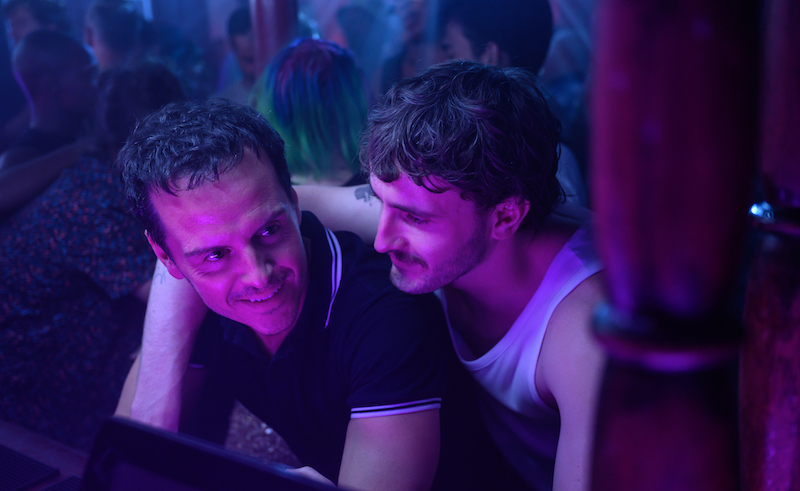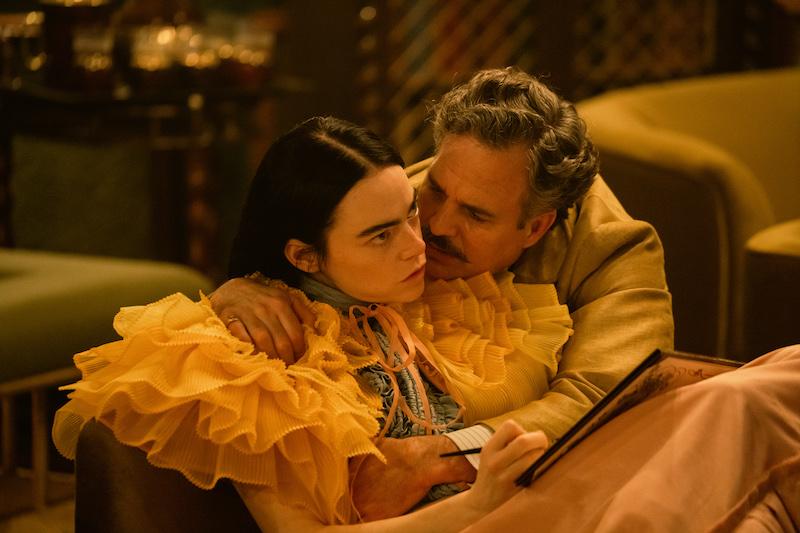Poor Things, Yorgos Lanthimos’s follow-up to The Favourite, is an intoxicating achievement, a ravishing, twisted, very funny and even radical fable that must be a major contender in the awards season that gets into gear as the London Film Festival closes.
The Favourite screenwriter Tony McNamara has adapted the late Scottish writer Alasdair Gray’s complex, multi-layered novel, removing the 1990s storyline, focussing on the Victorian section and shifting the point of view entirely to Gray’s fabulous heroine, Bella Baxter (Emma Stone). He’s also removed the ambiguity about her identity. Here, she is indisputably the creation of the Frankenstein-like London surgeon Dr Godwin Baxter (Willem Dafoe), who has performed something even more macabre than mere reanimation, if that's possible, to bring her to life.
The monster in this arrangement, however, is not Bella, but her creator. The doc is hideously disfigured, the victim of his father’s experiments on him as a boy. Set on continuing his father’s work, Baxter is an intriguing figure, expressing a paternal affection towards Bella while exercising an offhand cruelty that he obviously experienced himself, keeping her a virtual prisoner in his home as he observes and waits for her brain’s development to catch up with her body’s.
In the meantime, he enlists young student Max McCandles (Ramy Youssef, pictured below with Stone) to babysit the young woman and take notes. Bella is beautiful, unscarred by her travails; at first, she has the jerky movement and mannerisms of a child, but as her mind develops she proves to be a remarkable figure: eager for knowledge and experience. At the outset, every man in her life wants to control her – whether it’s Baxter, the lovesick Max, or the roguish lawyer Duncan Wedderburn (Mark Ruffalo), who persuades her to leave Baxter and travel with him abroad; but Bella has none of society’s patriarchal societal conditioning: she’s starting afresh in the world, and she’s having none of this male nonsense.
 Thus the traditional Victorian Grand Tour (they travel to Lisbon, Alexandria and Paris, with a sea voyage in between) is, for Bella, both an exploration of the world and her own potential; this discovery and self-determination includes a first, formative experience of poverty and injustice, and a fulsome and uproarious introduction to sex.
Thus the traditional Victorian Grand Tour (they travel to Lisbon, Alexandria and Paris, with a sea voyage in between) is, for Bella, both an exploration of the world and her own potential; this discovery and self-determination includes a first, formative experience of poverty and injustice, and a fulsome and uproarious introduction to sex.
Using a combination of real sets, painted backdrops and technology, Lanthimos and his production team have created an astonishing fantasy world, a surreal blend of Victoriana and baroque sci-fi, sometimes shot in atmospheric black and white, sometimes in saturated colour. Think of a marriage between the Brothers Quay, Guy Maddin and Terry Gilliam, as simply a starting point for this shimmeringly imaginative world.
Stone is remarkable as Bella, boldly diving into one of the best, certainly most unusual character she’s ever going to get. While her naturally expressive face works wonders in delineating Bella’s soaring learning curve, her performance is a completely physical one, every inch of her body in play; and it’s wonderful fun to see her killer one-liners decimate the hapless men before her.
Behind the ugliness and misdeeds Dafoe gives his scientist a touching dignity, Ruffalo is a caddish hoot (albeit with an appalling English accent) and Kathryn Hunter is typically glorious as a tattoo-covered brothel madam with a fetish for earlobes.
The performances, script and a highly original score by film newbie Jerskin Fendrix all contribute to a tonally dextrous piece, which encapsulates horror, farce, pathos and a highly resonant ode to self-determination and independence. Not many could marshal this kind of visionary cinema, but we’re getting used to it from Lanthimos.  The best adaptations are often not the most faithful, but those that take the essence of a scenario and employ it for an entirely different agenda. That’s the case with Andrew Haigh’s mysterious and heartbreakingly tender All Of Us Strangers.
The best adaptations are often not the most faithful, but those that take the essence of a scenario and employ it for an entirely different agenda. That’s the case with Andrew Haigh’s mysterious and heartbreakingly tender All Of Us Strangers.
His source is Taichi Yamada’s 1987 ghost story, Strangers. Yamada’s terrific set-up remains. A writer lives alone in a new and mostly unoccupied high rise, sinking deep into isolation until two separate encounters: the first, with the ghosts of his parents, who died in a car crash when he was a boy; the second a romantic one, with the only other occupant of his building.
Aside from switching the action from Tokyo to London, Haigh (Weekend, 45 Years) makes two key changes: first, he pulls back substantially from the more malign tropes of Japanese horror; secondly, he changes the neighbour’s gender, to a man, and makes this a gay relationship. The result retains the melancholy depiction of urban alienation, but adds, and is dominated by a poignant testament to the pain and isolation felt by a gay person struggling to come out, particularly when young and feeling, as one character says here, "like a stranger in my own family".
Andrew Scott is the writer, Adam, Paul Mescal (pictured above, right, with Scott) the neighbour Harry, who turns up blind drunk at his door one night and is, himself, desperately lonely. Claire Foy and Jamie Bell are both very touching as the parents – ghosts who Adam sees during a nostalgic visit to his childhood home, then continues to visit. Whether they are figments of his imagination or actual spectres is moot; either way, their conversations offer Adam a much-needed catharsis.
As sad as Adam’s childhood was, its soundtrack was glorious: Frankie Goes to Hollywood’s The Power of Love and The Pet Shop Boys’ Always on My Mind are put to particularly stirring use here.  Todd Haynes’s May December offers a reminder that a story doesn’t have to be otherworldly or macabre for its characters to be utterly diabolical. This is an unlikely crackerjack of a film, twisty, sly, provocative, and luxuriantly intelligent.
Todd Haynes’s May December offers a reminder that a story doesn’t have to be otherworldly or macabre for its characters to be utterly diabolical. This is an unlikely crackerjack of a film, twisty, sly, provocative, and luxuriantly intelligent.
Julianne Moore is Gracie, a woman who once scandalised her town when having a sexual affair with a 13-year-old boy, Joe, she met in a pet shop, was jailed, lost her family, but 20 years later is seemingly happily married to Joe (Charles Melton), with kids of their own. Elizabeth (Natalie Portman, pictured, above left, with Moore) is an actress who’s about to play Gracie in a film about the scandal, visiting the family in order to research her subject. But Elizabeth’s thoroughness, interviewing all those hurt by Gracie’s actions, reopens those old wounds, not least for Joe.
It's difficult to make a film about tabloid sensationalism, sleaze and child abuse without succumbing to tacky melodrama itself. Haynes not only avoids these traps, but at times mischievously acknowledges them. Moreover, his two leads are dab hands at delineating murky waters with nuance and a caustic intelligence.
Moore’s Grace is fascinating and elusive: shockingly unapologetic for her behaviour, the question is whether she’s in denial, or simply doesn’t care; is she vulnerable, or manipulative?
Portman is even better, her actress assuring everyone that she has their interests at heart, while secretly wanting the worst to be true, and increasingly turned on by the cracks she uncovers. There’s also a tantalising suggestion of a Persona-like merging of these two terrible people. For his part, Melton sweetly portrays a man who, while now in his thirties, is, unsurprisingly, suffering from an acute case of arrested development.  Daniel Kaluuya and Kibwe Tavares’ joint directing debut, The Kitchen, was a terrific choice to close the festival, in part because it is a canny counterpart to the opener, Emerald Fennel’s Saltburn: where that film was a largely fanciful satire on the upper classes, The Kitchen is a more grounded reflection on life at the bottom of the social ladder; where Fennel’s film was ice-cold, Kaluuya and Tavares’s is, despite its gritty milieu, enormously warm-hearted.
Daniel Kaluuya and Kibwe Tavares’ joint directing debut, The Kitchen, was a terrific choice to close the festival, in part because it is a canny counterpart to the opener, Emerald Fennel’s Saltburn: where that film was a largely fanciful satire on the upper classes, The Kitchen is a more grounded reflection on life at the bottom of the social ladder; where Fennel’s film was ice-cold, Kaluuya and Tavares’s is, despite its gritty milieu, enormously warm-hearted.
It's set in a vague near future; the architecture is given just a few retro-futuristic touches, accompanied by little bits of tech, notably in the form of snazzy interfaces (I particularly like the one in the barber’s shop). Other than these superficial touches, the main difference is that the wealth gap has only got bigger, while working class communities are being even more cynically destroyed to make way for aggressive gentrification.
The eponymous estate is a last bastion – dilapidated, its water and power frequently cut off, habitually raided by police, who remove residents each time (there’s no indication where they are ‘rehoused’). Despite its travails, The Kitchen throbs with communal life – presided over by the estate DJ, cutely named Lord Kitchener (a nice cameo by soccer legend and pundit Ian Wright).
Nevertheless, lifetime resident and embittered loner Izi (Kan Robinson) wants out, determined to earn enough at his job in a funeral home to rent an apartment in one of the bland new developments. Then, at an old lover’s funeral, he meets her son, Benji (Jedediah Bannerman, pictured above right, with Robinson), a lad in need of protection and, particularly, a father figure – throwing a spanner into Izi’s precious isolation.
Both Robison and the young Bannerman give appealing performances. Though the film would benefit from an additional layer to its story, it is refreshingly free of the crass tendency to turn working class estates into hotbeds of criminality – the actions here speak more of survival and rebellion.















Add comment